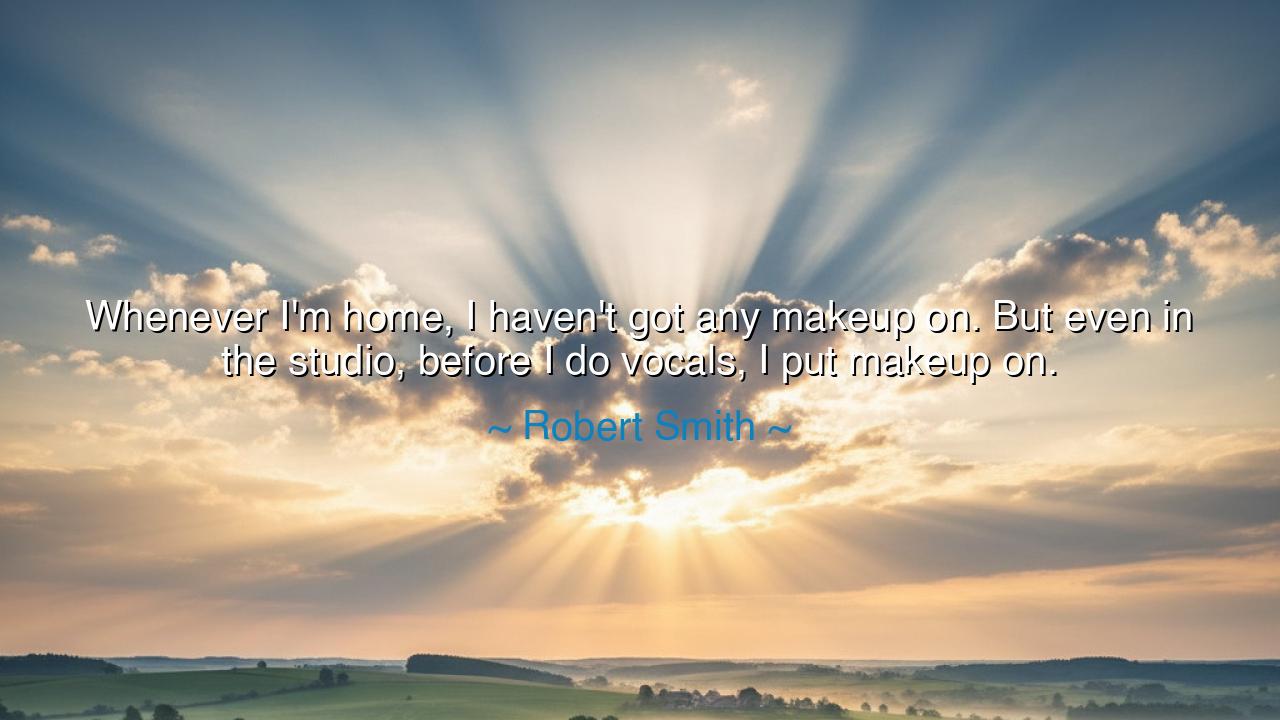
Whenever I'm home, I haven't got any makeup on. But even in the
Whenever I'm home, I haven't got any makeup on. But even in the studio, before I do vocals, I put makeup on.






In the paradox voiced by Robert Smith—“Whenever I’m home, I haven’t got any makeup on. But even in the studio, before I do vocals, I put makeup on.”—we hear an old truth about masks and meaning. The house is the sanctuary of unadorned breath; the stage—though hidden within a recording booth—is the temple of chosen appearance. One space asks for bareness; the other, for ritual. Thus the singer keeps two fidelities: the fidelity of rest and the fidelity of performance.
The ancients would nod. In the theaters of Dionysus, the actor’s mask did not lie; it revealed. It announced, “I am entering a role so that truth may be spoken at greater volume.” So, too, the singer’s makeup is not mere paint—it is a sign of passage. Crossing from home to studio, he marks the threshold with color, as priests once washed hands before the altar. The voice is not only throat and lung; it is also posture and presence. Ritual prepares both.
There is a deeper tenderness in the confession. To go without makeup at home is to reserve a corner of the soul that belongs to no audience. The unpainted face says, “Here I am cherished for being, not for bearing a sound.” But to reach for the palette before the vocals is to honor craft. The hand that shapes the line around the eye also sharpens the line of intention: now I serve the song. The order matters—privacy first, then offering.
Consider a story from another stage. The Noh actors of Japan spend long minutes applying the most minimal pigment and lifting a carved mask with slow reverence. Only then can the measured steps and delicate chant occur. It is not vanity but vocation; the adornment seals the promise to inhabit a role that carries grief and memory not easily borne bare-faced. When Robert Smith paints before the microphone, he stands in that lineage: the body is readied so that the unseen—timbre, ache, atmosphere—may pass through.
Or recall David Bowie’s lightning-bolt—no idle stripe, but a visual overture to a sonic world. Listeners arrived already tuned. So, too, a singer alone in the studio may require a sign that his ordinary self has given way to the keeper of tone and texture. The paint need not be seen to work; it changes the bearer. As the Roman orator arranged his toga to summon courage, the modern vocalist arranges his face to summon voice.
From this, learn a simple wisdom about human work: we are creatures of threshold and token. Create rites that distinguish home from battle, solitude from spectacle. Practical counsels: (1) Keep a private space where no performance enters—no costume, no script. (2) Before labor that matters, adopt a small rite—garment, scent, gesture—that tells the body, “Now we serve.” (3) Afterward, remove the sign—wash the face, hang the jacket—to return fully to those who love you apart from your role.
Finally, let this saying guide your mercy toward yourself and others. Do not fear the makeup that helps you carry a task; do not scorn the bare face that restores your name. Both are honest. The world needs your unpainted rest so you do not burn, and your painted courage so the song can be born. Wear the right face in the right sanctuary, and your work will be truer, your home warmer, your vocals deeper, and your life more whole.






AAdministratorAdministrator
Welcome, honored guests. Please leave a comment, we will respond soon